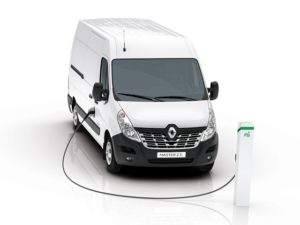Comments from the Treasury have given hope that fleets and drivers will continue to get financial support with the switch to plug-in vehicles, ahead of plans to tighten the forthcoming ban on petrol and diesel cars/vans.

According to a report in the Telegraph, Chancellor Sajid Javid is making a U-turn on current plans to scrap the Plug-in Car and Van Grants, which were revamped in 2018 to exclude plug-in hybrids and have been left up in the air in recent months; an announcement was initially expected in the 2019 Spending Review and then the Autumn Budget but the industry was left hanging in the air when Parliament was dissolved for the election campaign.
With the fleet and automotive industries having now been left reeling this week by the news that the ban on petrol and diesel vehicles will now possibly taking place from 2035 or even earlier instead of 2040 – to be explored in a new consultation along with plans to now include hybrids in the ban – the significance of the grants to help the shift to EVs continues to grow.
Although the Plug-in Car Grant was revamped in 2018 to axe support for plug-in hybrid electric vehicles and offer reduced levels for battery electric vehicles, the Telegraph report says the Treasury will continue paying some subsidies as part of a package of measures expected to be announced in next month’s Budget.
And an official comment from a Treasury spokesperson gives credence to this: “Our intention to phase out the Plug-in Car Grant was announced in 2018 but we recognise consumer incentives will continue to play a role beyond 2020.
“We’ll take a measured approach, balancing the needs of taxpayers, industry and consumers, and consider all options to increase the uptake of zero-emission vehicles,” they added.
The importance of the grants in helping to ensure plug-in vehicle take-up was emphatically stated by a number of organisations this week.
Accusing the Government of moving the petrol/diesel ban goalposts by bringing the date forwards and including hybrids in its plans – as suggested by the Committee on Climate change – Mike Hawes, chief executive of the Society of Motor Manufacturers and Traders (SMMT), said: “Manufacturers are fully invested in a zero-emissions future, with some 60 plug-in models now on the market and 34 more coming in 2020. However, with current demand for this still expensive technology still just a fraction of sales, it’s clear that accelerating an already very challenging ambition will take more than industry investment. This is about market transformation, yet we still don’t have clarity on the future of the Plug-in Car Grant – the most significant driver of EV uptake – which ends in just 60 days’ time, while the UK’s charging network is still woefully inadequate.”
And ACFO has called for: “A commitment that the Plug-in Car and Van Grants will remain in place for years to provide confidence to fleets that they are not a ‘here today, gone tomorrow’ funding solution.”
The BVRLA has welcomed the Treasury’s latest comments. Chief executive Gerry Keaney said: “The BVRLA continues to engage with Government to emphasise the importance of keeping the Plug in Grant to help stimulate the uptake of electric vehicles. Next month’s Budget provides the Chancellor with an opportunity to set the tone for a new decade in which the transition to decarbonised road transport will be won or lost. With the right support and incentives from government, fleets can help drive this transition more quickly.”
The Department for Transport has also confirmed that it is definitely exploring extending the petrol/diesel ban to plug-in hybrids as well as full hybrids; there had been some industry calls for clarity as to whether plug-in hybrids were categorically in the plans.
A DfT spokesperson said: “We are consulting on the Committee on Climate Change recommendation that any new vehicles sold after the phase out date must be zero emission at the tailpipe.
“We are continuing to take a technology-neutral approach to meeting our ambitions. However, the technologies on sale, and the market share of those technologies, must be compatible with achieving our 2050 Net Zero climate change target and our long-term air quality goals.
“Plug-in hybrid vehicles are and will continue to be important in helping motorists make the switch to a cleaner and different way of powering their vehicles. However, they are not always driven in zero-emission mode. As PHEVs are heavier than petrol or diesels, this can result in higher not lower levels of air pollution, carbon emissions and noise. Under the proposals we’re consulting on, the sale of new PHEVs would not be permitted after the phase-out date.”

